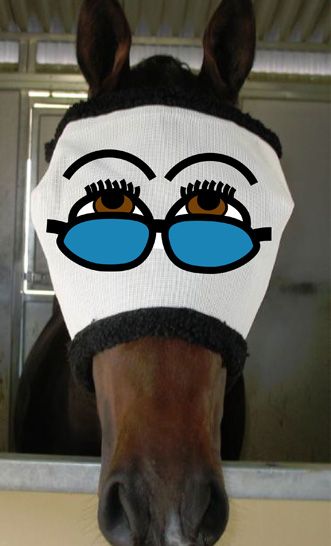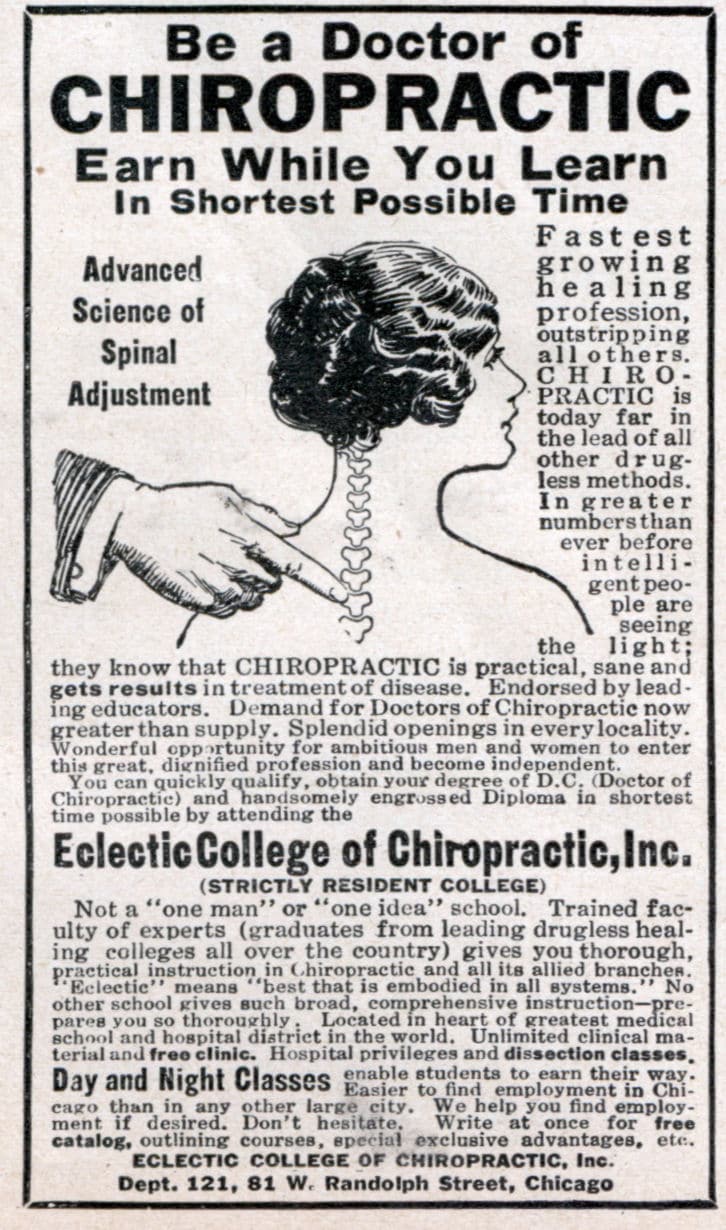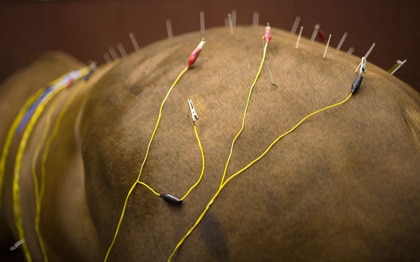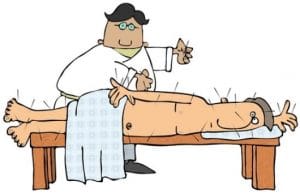 Right off the bat, I want to say that if you’ve elected to have acupuncture performed on your horse, and if you think that your horse has benefited from it, I think it’s great. I think it’s great that you love your horse, that you want to do the best for your horse, that you take care of your horse, etc., etc. You’ll hear not one word of criticism for me as to your motives.
Right off the bat, I want to say that if you’ve elected to have acupuncture performed on your horse, and if you think that your horse has benefited from it, I think it’s great. I think it’s great that you love your horse, that you want to do the best for your horse, that you take care of your horse, etc., etc. You’ll hear not one word of criticism for me as to your motives.
Plus, the “Acupuncture works – No it doesn’t!” stuff gets tedious, because there’s no possible way to resolve this sort of debate on-line. The fact that I’ve never seen a horse helped by the practice – and I’ve even tried to do it myself on some horses that were a bit back sore, back in the late 1980’s and early 1990’s, before a lot of information had come out – doesn’t mean that it’s impossible that some horses could be helped. Still…
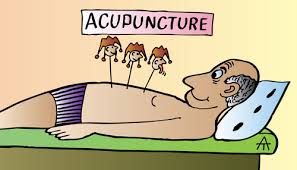 Still, it does seem to me that one might be able to parse acupuncture a bit: to be able to look at some of the things that are known about the practice, and discuss those things one at a time. Honestly, one of the things that’s most annoying to me about acupuncture – as well as about a lot of other things in veterinary medicine – is that nobody really seems very interested in getting to the bottom of some very legitimate questions.
Still, it does seem to me that one might be able to parse acupuncture a bit: to be able to look at some of the things that are known about the practice, and discuss those things one at a time. Honestly, one of the things that’s most annoying to me about acupuncture – as well as about a lot of other things in veterinary medicine – is that nobody really seems very interested in getting to the bottom of some very legitimate questions.
My thought has always been that veterinarians find themselves in a very important spot. We’re supposed to be intermediaries between those coming up with treatments and your horse. Veterinarians have all of this learning and all of this training, and, in my view, they’re supposed to be sifting through information and improving horse care. If you do that, it also means discarding treatments so that people who own horses don’t have to be stuck spending money on the same old worthless stuff year after year. I don’t think it should be up to horse owners to try to decide if a treatment is effective – they should be able to trust that veterinarians and veterinary medicine is doing that work for them. I’m not always sure that trust is well-placed.
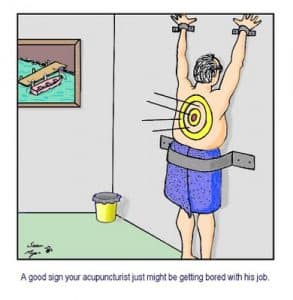 In my experience, those people that employ acupuncture tend to be both very enthusiastic about it and very defensive of it. I think that’s probably inevitable, at least to a certain degree. Acupuncture devotes have probably paid some money for it (either to learn it or to have it done) and, having done that, they may not want to have anyone suggesting that it’s less than wonderful. To actually look at things critically might mean that they might find out that the money was for naught, or at least not for very much. I can sympathize.
In my experience, those people that employ acupuncture tend to be both very enthusiastic about it and very defensive of it. I think that’s probably inevitable, at least to a certain degree. Acupuncture devotes have probably paid some money for it (either to learn it or to have it done) and, having done that, they may not want to have anyone suggesting that it’s less than wonderful. To actually look at things critically might mean that they might find out that the money was for naught, or at least not for very much. I can sympathize.
But let’s try anyway to have some reasoned discussion anyway. Let’s look at individual bits of information about acupuncture. Having done that, let’s see if we might be able to draw some conclusions.
ACUPUNCTURE IS AN ANCIENT FORM OF CHINESE MEDICINE FOR HORSES?
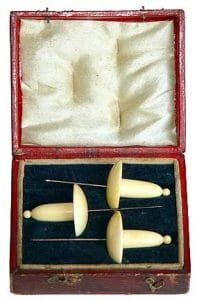
“Acupuncturation” horse needles, 19th century, British museum
No, it’s not. It’s demonstrably not, at least, not if you define acupuncture as placing fine needles at specific spots. This is important – in order to discuss acupuncture, you’d first have to agree on what it is. Even that can be a challenge. There are brief discussions of “needling” in some of the Chinese historical texts, but it’s pretty clear that the “needling” treatments used were cutting, bleeding, and cauterizing: exactly the sorts of things that most people wouldn’t tolerate today and which weren’t effective in those largely ineffective days of medical yesteryear.
Actually, it wasn’t until a big push by the Chinese government in the 1950’s that anyone – Chinese or otherwise – really paid a whole lot of attention to acupuncture. The new Chinse government, in an effort to bring some sort of “Chinese” medicine to a populace that had little access to health care, trained “barefoot” doctors to get out into the Chinese countryside to provide some sort of care to people: acupuncture was one of those things. It apparently really didn’t matter much it that “something” was very effective, but at least there was some care.
IT USES FINE NEEDLES
Well, today it does. Not historically (there are pictures of what was used). In the 19th century, “acupuncturation” was described as “torture” on horses because of the big spikes that were used for treatment, so it was largely abandoned. It wasn’t until the 20th century, when the needles got honed down to a tolerable size that more people got to trying it on horses.
IT PUTS THOSE NEEDLES AT SPECIFIC SPOTS
Fundamental to the practice of acupuncture (at least to most practitioners) is the idea that needles have to be placed at specific “points.” That sounds all well and good – perhaps even somewhat reasonable – until you find out that:
- There’s no mention of specific points throughout most of history
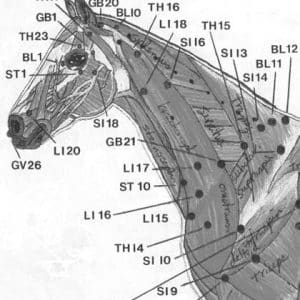 The specific books vary depending on what you’re reading. In fact, it’s been said that if you take all of the points in all of the books, there’s no spot on the human body that’s NOT an acupuncture point.
The specific books vary depending on what you’re reading. In fact, it’s been said that if you take all of the points in all of the books, there’s no spot on the human body that’s NOT an acupuncture point.- There’s no anatomical evidence for such a thing. I mean, sometimes you’ll find people saying that “points” occur at places where there are nerve and muscle junctions and such, but there’s absolutely nothing in any anatomy book that can be described as an acupuncture point. We can all agree on where a horse’s tail is – when it comes to points, not so much.
- Acupuncturists can’t find the same spots when looking for the same points anyway. This is research that was done in humans in the early 21st century, in Australia, where different acupuncturists were asked to mark the same “point” on the same person. Turns out that they missed by as much as a few centimeters. This leads to the conclusion that either acupuncturists don’t really know where “points” are either, or, that “points” are really pretty big, or that maybe they just don’t really exist at all. A 2019 review of 771 studies concluded the same thing. Call them what you want, but when you look deeper, the word “point” becomes pretty meaningless.
THOSE SPECIFIC SPOTS ARE ALONG SPECIFIC CHANNELS
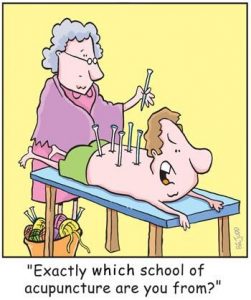 The idea that there is an “energy” or “force” (often called “chi”) flowing through channels does occur, but, as with “points” different books have different numbers of “channels” and put them in different places. In animals, rather than go to the work of actually finding these “channels” acupuncturists just decided to superimpose human charts onto animals and be done with it. That, then, explains why horses have gall bladder channels (also known as “meridians”) even though they don’t have gall bladders.
The idea that there is an “energy” or “force” (often called “chi”) flowing through channels does occur, but, as with “points” different books have different numbers of “channels” and put them in different places. In animals, rather than go to the work of actually finding these “channels” acupuncturists just decided to superimpose human charts onto animals and be done with it. That, then, explains why horses have gall bladder channels (also known as “meridians”) even though they don’t have gall bladders.
You may notice that one has to be able to suspend a certain amount of reality to go along with this whole acupuncture thing. That’s OK, I guess, but when it comes to medical treatments, I’m rather enthusiastic for – a stickler for, really – reality.
THOSE SPORTS CAUSE CHEMICALS TO BE RELEASED: OR SOMETHING
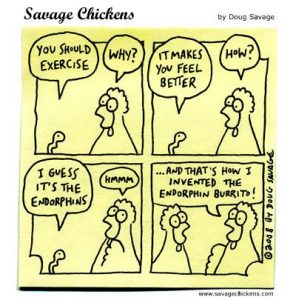
www.savagechickens.com
Acupuncture – if it really does anything significant – has to work by some mechanism, that is, there has to be some way it works. I suppose you can hang your hat on Chinese mythology, if you find that appealing (“chi” and such), but when one gets to debating whether or not invisible and unmeasurable energies are flowing around in channels that can’t be demonstrated waiting to be influenced at points that don’t exist, we’ll… ‘nuff said. Trying to perpetuate a medical anachronism in support of a therapy seems odd to me. I mean, the Romans had some pretty curious ideas and we’ve mostly moved on from them without problem (their influence is most cleanly demonstrated in medical vocabulary at this point).
Even some acupuncturists aren’t really ready to go with the “chi” thing, so, there have been a variety of biochemical suggestions as to why acupuncture may “work.” One of the popular ones is that it releases endorphins – the horse’s body’s natural opiate-like chemicals. That might be OK, I guess, except for the fact that things like lunging and horse trailering also release endorphins. In fact, about 15 years ago, there was a study done on acupuncture for airway disease in horses; turns out that acupuncture had the same biochemical effects on the horses as did handling them.
THOSE CHEMICALS DO THE HORSE’S BODY GOOD
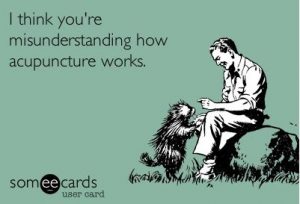 The weird thing about endorphin release as a mechanism of action is that exactly no one in medicine asserts that opiates ever cure anything. At best, opiates can be very useful for pain relief, which is good, and they can cause some euphoria, which people who take them may think is great, but they are also wildly addicting, which is why they are such a big problem in the United States at the moment. To me, if it’s endorphins that you want, it’d be a lot less trouble to throw your horse in the trailer, lunge him, or even brush him.
The weird thing about endorphin release as a mechanism of action is that exactly no one in medicine asserts that opiates ever cure anything. At best, opiates can be very useful for pain relief, which is good, and they can cause some euphoria, which people who take them may think is great, but they are also wildly addicting, which is why they are such a big problem in the United States at the moment. To me, if it’s endorphins that you want, it’d be a lot less trouble to throw your horse in the trailer, lunge him, or even brush him.
ACUPUNCTURE HAS NEVER BEEN SHOWN TO BE A CURE FOR ANYTHING
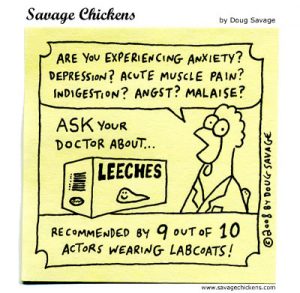 For all of the discussion about acupuncture (and it’s been discussed a lot over the past few decades), the fact is that acupuncture has never been shown to be a cure for any condition of any horse (or human, or wildebeest, or wombat, or anything…). I mean, advocates say that it can be used for a LOT of thing, but it hasn’t been shown to cure ANYTHING. I suppose that if acupuncture gets performed on a horse for long enough – if enough time passes – may conditions will get better. Or, if it’s thrown in with some other treatment, it might get some credit. Or, if a mistaken diagnosis is made and the horse gets treated, the treatment will get the credit for fixing a problem that never was. For me, anyway, these are not exactly ringing endorsements. But we all have our preferences.
For all of the discussion about acupuncture (and it’s been discussed a lot over the past few decades), the fact is that acupuncture has never been shown to be a cure for any condition of any horse (or human, or wildebeest, or wombat, or anything…). I mean, advocates say that it can be used for a LOT of thing, but it hasn’t been shown to cure ANYTHING. I suppose that if acupuncture gets performed on a horse for long enough – if enough time passes – may conditions will get better. Or, if it’s thrown in with some other treatment, it might get some credit. Or, if a mistaken diagnosis is made and the horse gets treated, the treatment will get the credit for fixing a problem that never was. For me, anyway, these are not exactly ringing endorsements. But we all have our preferences.
IN CONCLUSION
For nearly three decades, I’ve followed, researched, lectured about (at human medical and veterinary conferences), and published in historical journals about, published in books and scientific journals about acupuncture. I’ve learned a lot about the history of Chinese veterinary medicine and it’s been absolutely fascinating.
I’ve also learned a lot about people. It seems that when people are thoroughly invested in a practice, things like facts don’t really matter much. Once minds have been made up, they are hard to change (that would include me, but all it would take is some consistent scientific evidence). After all this time, you’d think that a lot of the controversies would have been settled: but they’re not. You’d think that established facts would be accepted: but they aren’t. You’d think that people perpetuating a practice would be working hard to make sure that they’re not just wasting everyone’s time and money: but they don’t seem to be.
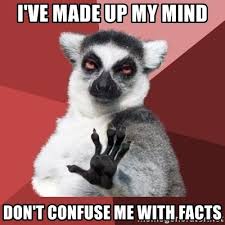 From what I can tell from reading the literature, if there is an effect of acupuncture, it’s likely to be:
From what I can tell from reading the literature, if there is an effect of acupuncture, it’s likely to be:
- Short-term
- Not related to “point” placement or any of the other constructs (that is, the effect is non-specific)
- Clinically irrelevant, that is, it doesn’t make much difference in the long run
- Also effective on the mind of the people invested in the treatment
I don’t use acupuncture in treating horses and I don’t advise my clients to use it on their horses. As I said when I started, if you think that you’ve seen your horse helped by acupuncture, I think that’s great. I laud you for caring so much about your horse. I just wish that folks that want you to try it on your horse worked as hard to demonstrate whether it does something of clinical significance as they do at promoting it.
You’d think that time might tell, but it apparently hasn’t so far. I think that fact says a lot more about people than anything else.

